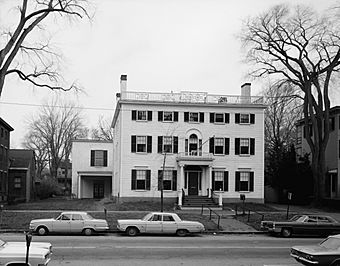Portland Club (Portland, Maine) facts for kids
|
The Portland Club
|
|
|
U.S. Historic district
Contributing property |
|

Front of The Portland Club, 1969 HABS photo
|
|
| Location | 156 State St., Portland, Maine |
|---|---|
| Built | 1805 |
| Architect | multiple |
| Part of | Spring Street Historic District (ID70000043) |
| NRHP reference No. | 73000120 |
Quick facts for kids Significant dates |
|
| Added to NRHP | January 25, 1973 |
| Designated CP | April 3, 1970 |
The Portland Club is a special social club located at 156 State Street in Portland, Maine. It's a place where people gather for meetings, events, and to connect with others.
Contents
Discovering the Club's Home
The Portland Club is found inside a beautiful old building called the Hunnewell-Shepley Mansion. This mansion is in the West End area of Portland. It was built way back in 1805.
A Historic Building's Style
The mansion was designed by a famous architect named Alexander Parris. He created it in a style called "Federal style." Later, another architect, John Calvin Stevens, added some "Colonial Revival" updates. The club has been in this amazing building since 1921. It's so important that it was added to the National Register of Historic Places in 1973. This means it's a special building recognized for its history.
What's Inside the Club?
The Portland Club is home to many interesting things. You can find old paintings and antiques that have been there for a long time. There are also more than 12 antique mahogany pool tables on the second floor! The club has always been a popular spot for social events in Portland. It even has a history of being one of the first clubs to welcome women into its organization, creating "The Woman's Portland Club."
Current Activities at the Club
Today, the Portland Club continues to be a lively place. It hosts dinner meetings with interesting talks, fun brunches, and various other social gatherings throughout the year.
The Club's Interesting History
The Portland Club started in 1886. A man named Fred Dow and his friends decided to make their informal get-togethers into a real club.
Why the Club Started
The main goal for these men was to "discuss current events." Even though it wasn't written in their official rules, they also wanted to support the Republican Party. At that time, Republicans were in charge of Maine's government. Because of this, the Portland Club became known as a very important place for politics in the state for many years. The club bought the mansion in 1921, and it has been its home ever since.
 | Victor J. Glover |
 | Yvonne Cagle |
 | Jeanette Epps |
 | Bernard A. Harris Jr. |



